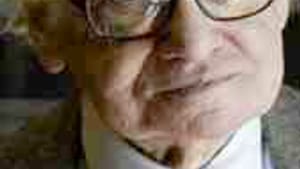Stay in the Loop
BSR publishes on a weekly schedule, with an email newsletter every Wednesday and Thursday morning. There’s no paywall, and subscribing is always free.
Milton Babbitt's ultimate message: Stop trying to hold on
How I learned to love Milton Babbitt

I had no idea what was happening. The saxophone caterwauled ridiculously, and the piano seemed to chatter away at some other piece. I could discern no melody or beat; there was no harmony or repeating gesture to hold onto. It was chaos, and I was this close to giving up on the music. The composer was Milton Babbitt.
Babbitt, who died January 29 at the age of 94, was the hero of certain composers and the bête noire of audiences— the few that ever heard his music, that is. He pushed full-tilt intellectualism in American classical music at a time when it was clearing its throat to be taken seriously as an academic subject.
For Babbitt, though, academia wasn't enough. He wanted music to be a quantifiable scientific discipline, and he filled rooms with these new machines called computers to make his point. Audiences didn't understand his music, but as he would say, who understands particle physics?
Babbitt went further than Schoenberg or any of the 12-toners. All they controlled was the order of notes. Babbitt regulated everything: pitch, dynamic, rhythm, range, you name it. Total serialism, it was called. Babbitt invented it, and the academy loved it.
My youthful presumptions
I kept my love of Brahms and the Delfonics to myself when working on my master's degree in composition, although I needn't have been so circumspect— teachers understand a lot more than students realize. It's the kids who are the most hidebound.
I still remember the look on the face of one doctoral candidate when I unguardedly confessed to him, in my 22-year-old confidence, that all anyone really needed to know to write choral music was the English folk songs of Vaughan Williams, and maybe Gene Puerling's arrangements for the Hi-Lo's. The look on the doctoral student's face reflected neither anger nor laughter nor incredulity. It was pity.
Well, I haven't really changed my mind. Besides, I like schemes as much as anyone. I even caught the Sudoku craze for a while, until I got bored counting numbers. And I actually enjoy toying with musical systems. But I never bought into the demolition of tonality that lay underneath serialism. I just didn't take to it, and that was that.
An "'Aha!' moment with James Joyce
But then a couple things happened.
I read Ulysses. James Joyce exploded the English language, and I picked my way through the blast zone carefully at first, looking closely at smoking shards of phrases that resisted meaning.
Some yielded only sounds, and some, echoes of sounds. Some let off delayed puns, and I'd think, Really? He made a joke? And I got it?
That gave me courage, and I read faster, no longer worrying about the meaning. Pretty soon I had finished the book, and looking back across the landscape, I felt... renewed.
Face-paint and feathers
Then the Art Ensemble of Chicago came to town, and I went to see them— my first time at a live performance of avant-garde jazz. The trumpeter Lester Bowie led in his white lab coat, and Roscoe Mitchell played saxes all the way down to the contrabass, the size of a filing cabinet. Guys in face-paint and feathers and African hats played dozens of instruments.
Midway through a 20-minute free-jazz squealing cacophony, audience members were leaving, but I had become transfixed. My eyes darted from one player to the other as they moved. I couldn't tell much, but I could tell that they were listening to each other, and I wanted to know what would happen next. Afterward, I had to catch my breath.
Like a flock of starlings
So here I was with this piece by Milton Babbitt. The saxophonist and pianist caterwauled and chattered, there was nothing to hold onto, and just as I was about to give up, a literally funny thing happened. The jokes of Ulysses occurred to me. Free jazz occurred to me, and feathers and hats, and I noticed that I had stopped trying to hold on.
At that precise moment I also noticed something else: The musicians were listening to each other. They were moving. They moved the way a flock of starlings moves over a field of cut corn: one feather on one bird moves and they all move; one causes the other, but there is no cause; they follow and are simultaneous, which is impossible, or at least too fast to tell. Like particle physics, I guess.
And as quick as that, I got Milton Babbitt. He called that piece Whirled Series. (That's right, say it out loud— Joyce would.) The theory behind it, I didn't care about. Still don't. I don't care about physics, either, or Sudoku, or face-paint. All I know is, I had no idea what was happening. And I wanted to know what would happen next.♦
To read responses, click here and here.
Babbitt, who died January 29 at the age of 94, was the hero of certain composers and the bête noire of audiences— the few that ever heard his music, that is. He pushed full-tilt intellectualism in American classical music at a time when it was clearing its throat to be taken seriously as an academic subject.
For Babbitt, though, academia wasn't enough. He wanted music to be a quantifiable scientific discipline, and he filled rooms with these new machines called computers to make his point. Audiences didn't understand his music, but as he would say, who understands particle physics?
Babbitt went further than Schoenberg or any of the 12-toners. All they controlled was the order of notes. Babbitt regulated everything: pitch, dynamic, rhythm, range, you name it. Total serialism, it was called. Babbitt invented it, and the academy loved it.
My youthful presumptions
I kept my love of Brahms and the Delfonics to myself when working on my master's degree in composition, although I needn't have been so circumspect— teachers understand a lot more than students realize. It's the kids who are the most hidebound.
I still remember the look on the face of one doctoral candidate when I unguardedly confessed to him, in my 22-year-old confidence, that all anyone really needed to know to write choral music was the English folk songs of Vaughan Williams, and maybe Gene Puerling's arrangements for the Hi-Lo's. The look on the doctoral student's face reflected neither anger nor laughter nor incredulity. It was pity.
Well, I haven't really changed my mind. Besides, I like schemes as much as anyone. I even caught the Sudoku craze for a while, until I got bored counting numbers. And I actually enjoy toying with musical systems. But I never bought into the demolition of tonality that lay underneath serialism. I just didn't take to it, and that was that.
An "'Aha!' moment with James Joyce
But then a couple things happened.
I read Ulysses. James Joyce exploded the English language, and I picked my way through the blast zone carefully at first, looking closely at smoking shards of phrases that resisted meaning.
Some yielded only sounds, and some, echoes of sounds. Some let off delayed puns, and I'd think, Really? He made a joke? And I got it?
That gave me courage, and I read faster, no longer worrying about the meaning. Pretty soon I had finished the book, and looking back across the landscape, I felt... renewed.
Face-paint and feathers
Then the Art Ensemble of Chicago came to town, and I went to see them— my first time at a live performance of avant-garde jazz. The trumpeter Lester Bowie led in his white lab coat, and Roscoe Mitchell played saxes all the way down to the contrabass, the size of a filing cabinet. Guys in face-paint and feathers and African hats played dozens of instruments.
Midway through a 20-minute free-jazz squealing cacophony, audience members were leaving, but I had become transfixed. My eyes darted from one player to the other as they moved. I couldn't tell much, but I could tell that they were listening to each other, and I wanted to know what would happen next. Afterward, I had to catch my breath.
Like a flock of starlings
So here I was with this piece by Milton Babbitt. The saxophonist and pianist caterwauled and chattered, there was nothing to hold onto, and just as I was about to give up, a literally funny thing happened. The jokes of Ulysses occurred to me. Free jazz occurred to me, and feathers and hats, and I noticed that I had stopped trying to hold on.
At that precise moment I also noticed something else: The musicians were listening to each other. They were moving. They moved the way a flock of starlings moves over a field of cut corn: one feather on one bird moves and they all move; one causes the other, but there is no cause; they follow and are simultaneous, which is impossible, or at least too fast to tell. Like particle physics, I guess.
And as quick as that, I got Milton Babbitt. He called that piece Whirled Series. (That's right, say it out loud— Joyce would.) The theory behind it, I didn't care about. Still don't. I don't care about physics, either, or Sudoku, or face-paint. All I know is, I had no idea what was happening. And I wanted to know what would happen next.♦
To read responses, click here and here.
Sign up for our newsletter
All of the week's new articles, all in one place. Sign up for the free weekly BSR newsletters, and don't miss a conversation.

 Kile Smith
Kile Smith